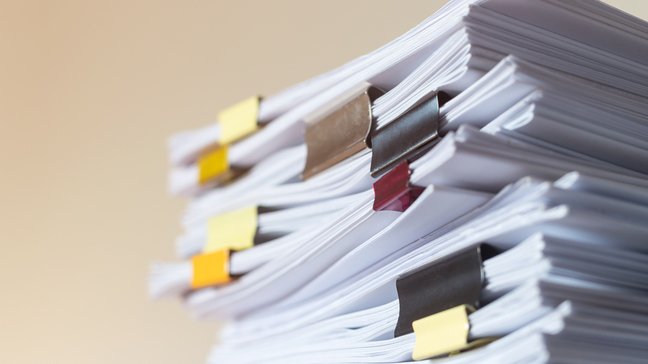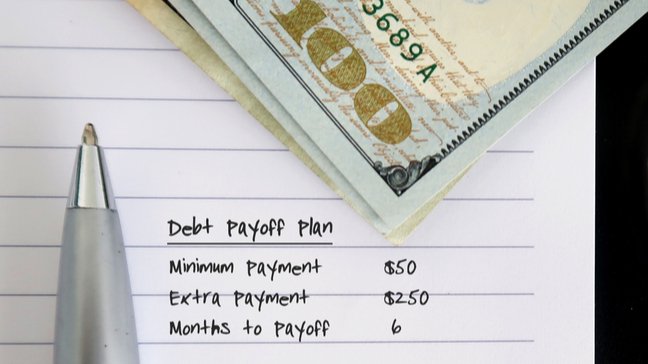I graduated from law school in 2011 with a whopping $208,000 of student loan debt. To make matters worse, the job market was horrible for new lawyers.
It would have been easy to sulk, complain, and make excuses. But, I refused to do that. A negative attitude wasn’t going to help me get out of debt. As part of my decision to take control of my financial future, I decided to tackle my student loan debt head-on. In order to do that, I needed to know the smartest way to pay off my loans.
Here’s what I learned.
First, organize your student loans

In order to know which loans to repay first, you need to know the details about all of your student loans. (If you have many, this can take some time!)
You should know:
- Whether you have private and/or federal loans.
- Whether you have a cosigner on any of your loans.
- Whether you have fixed or variable interest rates on your loans.
- Whether you have subsidized or unsubsidized loans.
- What the interest rates are on your loans.
Next, decide on your repayment plan
After your deferment/grace period ends, you’ll need to select a repayment plan for your student loans.
- For private loans, you may select a standard or extended repayment plan (10- or 25-year plan).
- For federal loans, you may select a standard, graduated, extended, income-contingent, income-sensitive, or income-based plan. Federal loans are also eligible for the Federal Loan Forgiveness program (where federal loans are forgiven after 10 years of working a qualifying public service job).
Decide if (and how) you’ll make accelerated payments

After you’re on a repayment plan and making regular minimum payments, you can determine which loans to pay off faster and in what order.
Note that you should also have other savings established – such as a 6-12 month emergency fund -prior to paying down your student loans faster. But once you’re ready, here’s what you should do.
1. Pay off private loans
Private loans are the most dangerous student loans for a variety of reasons. Often, they have variable interest rates, require a cosigner, may not be consolidated, are ineligible for deferment or forbearance, and have limited repayment options.
If you die before repayment in full, the loans become due (which is why, if you have a cosigner, you should have life insurance to cover the amount of debt you have in private loans). For these reasons, private student loans should be your priority.
At this stage, you should also consider student loan refinancing, which could be a great way to lower your interest rate and possibly reduce your total monthly student loan payments.
Fiona is one option that can give you refinancing quotes from multiple lenders without affecting your credit score. That way you can get a sense of what your rates are from a variety of top-tier lenders.
2. Pay off loans with a cosigner
Your cosigner did you a favor by helping you get loans you otherwise couldn’t have, and she trusted you to repay them. You should pay off loans with cosigners to repay the favor, maintain a good relationship, and keep your word with your cosigners.
Anything could happen to you, and you don’t want someone else to be on the hook for your loans if you’re unable to pay.
3. Pay off loans with variable interest rates
A variable interest rate on student loans means that the interest rate changes over time, based on an underlying benchmark rate or index. The risk associated with variable interest rates is that the rate can go up, and you’ll have to pay more. Typically, these will be your private loans (except for some federal loans disbursed between 1998 and 2006).
4. Pay off unsubsidized loans with the highest fixed interest rates

An unsubsidized loan is a loan that accrues interest from the disbursement date. When an unsubsidized loan is accruing interest, the amount of interest is added to the principal, and you’ll have to pay interest on the increased principal amount (this is called capitalization). Since high-interest rate loans will have grown the most by the time you’re in repayment, these loans should be a priority to pay off.
A fixed interest rate means that the interest rate is set and will not change over the life of the loan. With fixed interest rate loans, there is no risk of the rate increasing, making them less risky than variable interest rate loans. Most federal student loans have fixed interest rates that are set by federal law. The higher the interest rate, the faster the interest on the loan grows, and the more money you owe. Therefore, you want to pay off high-interest-rate loans quickly.
5. Pay off subsidized loans with high interest rates
A subsidized loan is a loan that the Federal Government pays the interest on while it is deferred, in the grace period, and during some other times. Thus, subsidized loans are not accruing interest while you’re in school. Your interest on subsidized loans should be zero when you begin repayment. However, you’ll want to pay down the principal of subsidized loans with high interest rates to avoid future growth.
6. Pay off unsubsidized loans with low interest rates
Again, an unsubsidized loan means that the interest accrues from the time of disbursement. However, if the interest rate is very low, you won’t have much capitalization by the time you’re in repayment. For this reason, pay unsubsidized, low interest, loans after subsidized high-interest loans.
(Note: an exception to this rule would be if your unsubsidized, low interest, loans have been in deferment for so long that the capitalization is high. In this case, you’d want to pay down the unsubsidized, low interest, loans prior to the subsidized high-interest loans.)
7. Pay off subsidized loans with low interest rates
Subsidized loans with low interest rates are the best types of student loans. You want to put extra money toward these last because the government will have paid for the interest while you were in school, and the interest that accrues during repayment will be the lowest out of all your loans.
Some tips on paying your student loans early

Regardless of which loans you choose to put more money toward, remember to put the additional amount on the principal of the loans, not the interest. Each lender varies as to how you’re able to pay more than the minimum.
To make sure you are paying off the principal, contact your lender to find out how it accepts payments toward the principal. For example, a lender may require additional payments be made over the phone, or it may require a letter stating that the monthly payment is paid and the additional money should go toward the principal. Sallie Mae only requires that you enter the additional amount in the “payment amount” box online. So, it depends on your lender.
Make sure to find out because you do not want to put extra money on the interest. By putting additional money on the principal, you lower the amount of future interest.
To recap, I’ll use my loans as an example. I committed to the standard repayment plan (with a plan to pay off my loans in 10 years), and began putting additional money on my private loans (both of which my mom was a cosigner and had variable interest rates).
After paying off my private loans, I put extra money on a high interest, unsubsidized loan (that had accrued thousands of dollars in interest throughout law school). After those are paid in full, I will put additional money toward my loans with lower fixed interest rates, both of which are subsidized.
Don’t give up!
Hopefully, you are in a position to pay off your student loans early. However, if you have to choose which debt to pay because you can’t afford all your minimum payments, pay your student loans first (over credit card and medical debt).
Student loan debt is arguably the most dangerous type of debt because it is usually not dischargeable in bankruptcy. This means that if you claim bankruptcy, your credit card debt and medical debt will be discharged, but your student loan debt will not (i.e., after bankruptcy, you still owe your student loan debt).
Student loan debt should not discourage you. Your past is your past. It’s an opportunity to learn how to overcome debt and face today’s challenges. I’ve taken my student loan debt as a learning experience on how to get rid of debt quickly and build wealth (something I knew nothing about prior to graduating from law school).
Now, I can’t get enough of financial planning; I’ve even started blogging about it. Intentional living, believing in myself, and adapting to changing times is what success means to me. There are no excuses.


